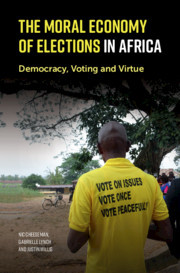The Moral Economy of Elections in Africa Democracy, Voting and Virtue
Langue : Anglais
Auteurs : Cheeseman Nic, Lynch Gabrielle, Willis Justin

A radical new approach to understanding Africa's elections: explaining why politicians, bureaucrats and voters so frequently break electoral rules.
Do elections turn people into democratic citizens? Elections have long been seen as a way to foster democracy, development and security in Africa, with many hoping that the secret ballot would transform states. Adopting a new approach that focusses on the moral economy of elections, Nic Cheeseman, Gabrielle Lynch and Justin Willis show how elections are shaped by competing visions of what it means to be a good leader, bureaucrat or citizen. Using a mixed-methods study of elections in Ghana, Kenya and Uganda, they explore moral claims made by officials, politicians, civil society, international observers and voters themselves. This radical new lens reveals that elections are the site of intense moral contestation, which helps to explain why there is such vigourous participation in processes that often seem flawed. Demonstrating the impact of these debates on six decades of electoral practice, they explain why the behaviour of those involved so frequently transgresses national law and international norms, as well as the ways in which such transgressions are evaluated and critiqued ? so that despite the purported significance of 'vote-buying', the candidates that spend the most do not always win.
Introduction. Writing African elections; 1. Towards a moral economy of elections in Africa; 2. Elections, states and citizens: a history of the ballot in Ghana, Kenya and Uganda; Part I. Promoting Civic Virtue: National Exercises: 3. Making states and citizens through the ballot; 4. The eyes of the world are upon us: the aspirations and limitations of international election observation; 5. Creating democrats: Civil society and voter education; Part II. The Moral Economy in Action: 6. Performing virtue: politicians, leadership and election campaigns; 7. Navigating multiple moralities: popular expectations and experiences of the polls; 9. Conclusion: the electoral fallacy revisited.
Nic Cheeseman is Professor of Democracy and International Development at the University of Birmingham. He is the author or editor of ten books, including Democracy in Africa (2015) and How to Rig an Election (2018), and his research has won a number of prizes including the Frank Cass Award for the best article in Democratization (2015) and the Joni Lovenduski Prize for outstanding professional achievement by a midcareer scholar (2019) from the UK Political Studies Association. He is the founding editor of the Oxford Encyclopedia of African Politics and the founder of www.democracyinafrica.org.
Gabrielle Lynch is Professor of Comparative Politics at the University of Warwick. She is the author of over 30 articles and book chapters, and author or editor of five books, including I Say to You: Ethnic Politics and the Kalenjin in Kenya (2011) and Performances of Injustice: The Politics of Truth, Justice and Reconciliation in Kenya (2018). She is the Vice President of the British Institute in Eastern Africa and Deputy Chair of the Review of African Political Economy, and wrote a regular column in Kenya's Saturday Nation (2014-2018) and The East African (2015-2017).
Justin Willis is Professor in History at Durham University. He is the author of Mombasa, the Swahili and the Making of the Mijikenda (1993), Potent Brews: A Social History of Alcohol in East Africa 1850-1999 (2002) and co-editor of The Sudan Handbook (2011) – well as numerous articles on the history and politics of Ghana, Kenya, Sudan, and Uganda. He has previously served as Director of the British Institute in Eastern Africa.
Gabrielle Lynch is Professor of Comparative Politics at the University of Warwick. She is the author of over 30 articles and book chapters, and author or editor of five books, including I Say to You: Ethnic Politics and the Kalenjin in Kenya (2011) and Performances of Injustice: The Politics of Truth, Justice and Reconciliation in Kenya (2018). She is the Vice President of the British Institute in Eastern Africa and Deputy Chair of the Review of African Political Economy, and wrote a regular column in Kenya's Saturday Nation (2014-2018) and The East African (2015-2017).
Justin Willis is Professor in History at Durham University. He is the author of Mombasa, the Swahili and the Making of the Mijikenda (1993), Potent Brews: A Social History of Alcohol in East Africa 1850-1999 (2002) and co-editor of The Sudan Handbook (2011) – well as numerous articles on the history and politics of Ghana, Kenya, Sudan, and Uganda. He has previously served as Director of the British Institute in Eastern Africa.
Date de parution : 02-2021
Ouvrage de 288 p.
15.5x23 cm
Date de parution : 02-2021
Ouvrage de 288 p.
15.2x22.8 cm
Thème de The Moral Economy of Elections in Africa :
© 2024 LAVOISIER S.A.S.



